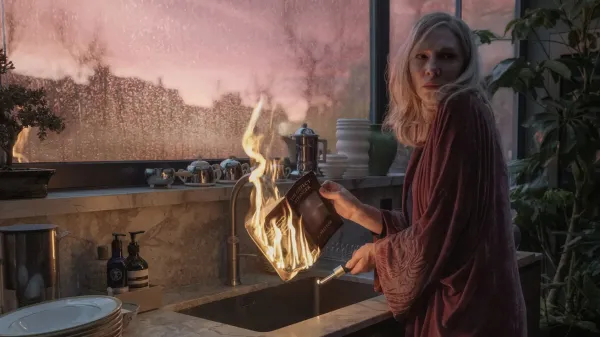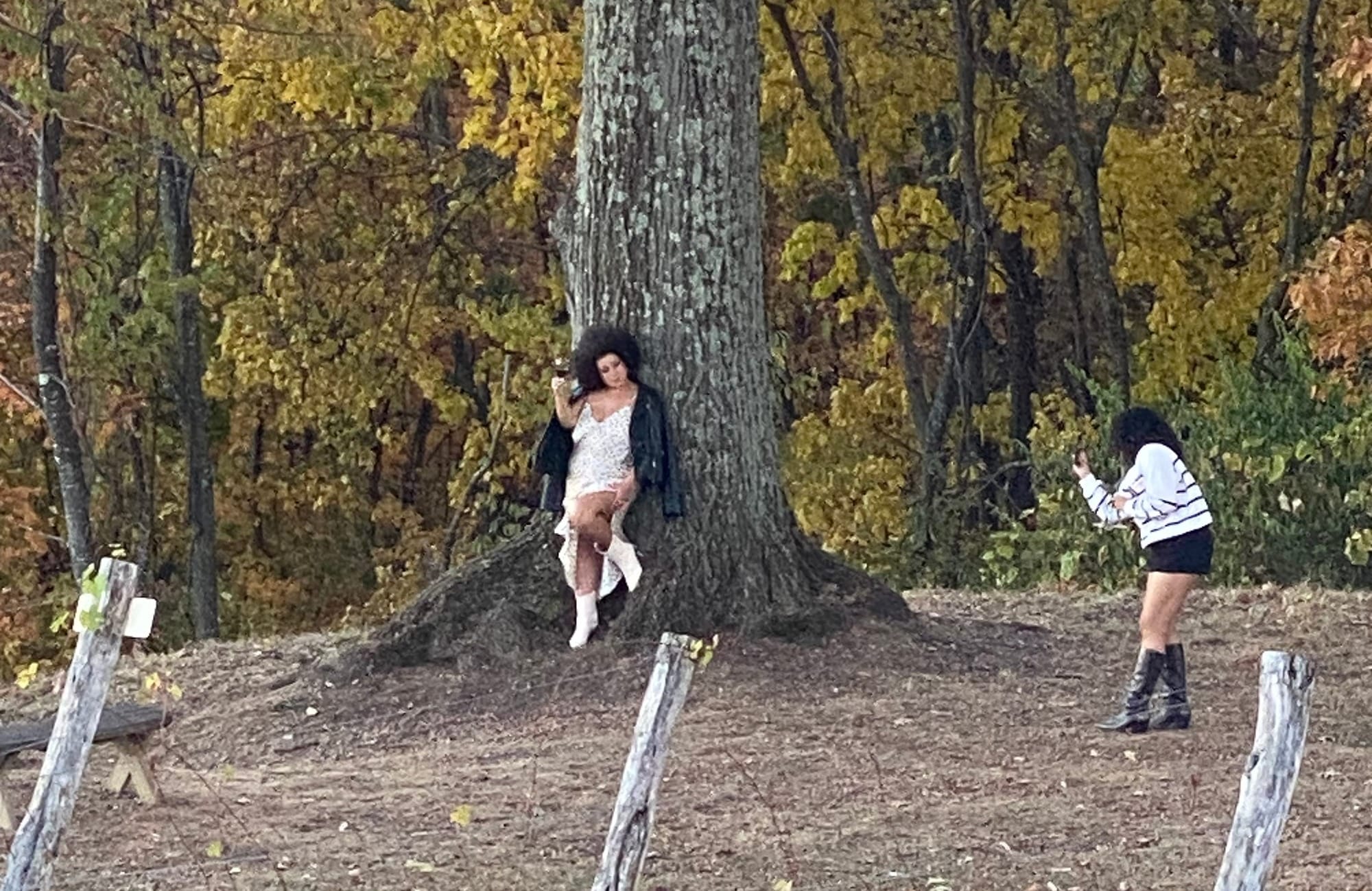#24: If a TV show doesn't generate memes, does it exist at all?
Death By Consumption
10/15/24 - 10/21/24
As a weather connoisseur, it is my professional opinion that a series of 80-degree days this close to November seems... not great. As always, the spookiest part of spooky season is our impending climate disaster. In NYC we get a handful of these unseasonably gorgeous days every year now, and you can sense the discomfort in pretty much everyone outside. Some people keep their heavy jackets on, sweating through denial, while others (Republicans, or at the very least RFK supporters, I have to assume) walk around in shorts and T-shirts and blessed smiles, somehow able to experience uncomplicated joy at such a beautiful day. The rest of us feel an anxious mix of uneasy enjoyment, soaking up the sun while nervously saluting each other like, "Greetings, neighbor! Such good fortune with this weather, yes?" and the whole time it feels like a sniper's dot is on your forehead. Anyone know what we can do about this whole thing? Keep sorting our recycling, I guess?
"Disclaimer" episodes 1-3 — on Apple TV+
What is it about Apple TV+ originals that make you forget they exist? They clearly spend a zillion dollars on productions, but even Cate Blanchett and Alfonso Cuarón teaming up for some sort of British Little Lies can't seem to move the needle. Is Apple TV+ cursed? Surely someone must be watching all the stuff they put out, right?
My current working theory is that plenty of people are watching Apple TV+ originals, but not the right kind of people to generate conversation — namely, hyper-online gays and theys who turn every frame of a show into a meme that is then stolen by Evan Ross Katz's Instagram account, thereby generating millions of dollars of earned media for the show. The internet and social media have splintered in recent years, sure, but we all just survived the Great War of Is Kamala Brat? which showed, if nothing else, that online fandoms still carry a ton of cultural power. If a TV show doesn't generate a single meme, does it even exist at all? Apple TV+ desperately needs to hire an army of twinks, because there is absolutely no reason the Cate Blanchett is getting wine-drunk and acting crazy in a gorgeous townhouse every week and no one online is even talking about it.
On the other hand, it might be because watching "Disclaimer" feels like working a puzzle, but not a super enjoyable one. It's one of those mysteries where the mystery is only sustained by the narrative structure absolutely refusing to give you any answers until episodes, like, 6 or 7, I assume. The characters all seem to know exactly what's going on, but to keep the mystery going the viewer has to be left in the dark. Frustrating! And kind of cheap!

But some people have raved about it, and we're practically halfway through already, so I guess we'll push on. And unfortunately, now that I’m in it I do feel the need to know what is going on, but I already suspect I won’t be satisfied by the resolutions to any of my questions. Why does everyone hate Cate Blanchett? What the hell is Kevin Kline doing? And why is Borat pretending to be a serious dramatic actor? It turns out it's kind of impossible to watch Sacha Baron Cohen screaming at his wife Cate Blanchett without having a little voice in the back of your head going, "Please say 'my wife,' please say 'my wife'..."
Practical Magic (1998) — at a friend's
Yes, I have watched this twice in two weeks. A dear friend had never seen it, so an organized viewing was mandatory. Take this as your sign that, if you haven’t watched Practical Magic yet this October, you have a little over a week to rectify the situation.
The Fog (1980) — on Criterion
I hate to slander the work of John Carpenter and Jamie Lee Curtis, but this was just okay. The ambiance is perfectly moody, and the concept of a mysterious fog descending on a town and something in the fog killing people is fantastic, but the execution got a bit goofy at times, like one of those X-Files episodes that didn't age well. Plus, Jamie Lee Curtis barely has anything to do in this! She gets top billing but she's mostly just along for the ride, while all the others get to do the more fun scenes. Still, though, it’s beautifully shot, with that classic John Carpenter eerie soundtrack, so it was certainly a vibe, as the kids would say. We don't really get a lot of media focused around the fear of lepers anymore, huh?
Don't Look Now, by Daphne Du Maurier (1952-1980, collected in 2008) — paperback
This NYRB collection gathers some of Daphne Du Maurier's most famous short stories (ever heard of a little tale called "The Birds"???) along with some lesser-known or unpublished ones, in one slim book that I wish were longer. I'm an unapologetically certified Daphne Du Maurier freak, having read and loved Rebecca, Jamaica Inn, and My Cousin Rachel, which are all so perfectly moody and sinister. In contrast to her novels, though, she seemed to free herself in her short stories to get a little weirder and less based in reality. The 9 stories in this book are extremely gothic tales, full of ghosts, death, and strange happenings, each one crafted to perfection. I swear I had the extremely anodyne thought, "I'm having so much fun reading this!" at several points in this book, which is a dumb thing to think to yourself, but also more books should make you think that.
Queer as Folklore: The Hidden Queer History of Myths and Monsters, by Sacha Coward (2024) — hardcover
Historian Sacha Coward’s new book details the forgotten queer histories and origin stories of our myths and folklores, from more obviously queer creatures like mermaids and fairies to ones with more surprisingly gay histories, like werewolves and even aliens. Outside his writing and researching, Sacha Coward is a historical tour guide, and the book’s style feels like he’s taking you on a highly entertaining guided tour — it moves at a quick pace, giving you a comprehensive overview, with just enough surprising little tidbits dropped (there’s at least one interesting or revealing fact on practically every page) that you come away having had a great time, and feeling at least a little more knowledgeable.
Admittedly, the scope of the book is probably a little too wide — it goes from ancient Greek heroes to the X-Men, which definitely stretches the bounds of what we mean by “folklore.” He makes it all loosely hang together nicely, but it feels like we’re whipping through myths and legends at a rapid pace, flying from teenage vampires to Native American skinwalkers in a matter of paragraphs. There are many extremely interesting revelations in here, especially when he draws fascinating connections between ancient European, Native American, and Asian mythology, and the ways queerness shows up in and impacts those ancient myths. But once we take it to a place of analyzing the queerness of HAL, the evil AI in 2001: A Space Odyssey, we’ve prrrrrrobably strayed a bit too far from the book’s thesis. Not that any of it is uninteresting! I actually have the opposite critique: there is so much in here that this should have been split into a series of books, rather than trying to cram it into a singular overview. At times, it felt like a tour guide who drops a very compelling piece of information before ushering you into the next room before you can process what you've learned. Like sure, HAL was probably a gay little evil computer, but wait, weren’t we just talking about Dracula?
The book does make a convincing case from beginning to end that queerness has been not only present, but integral to society and culture since the earliest days of humanity. And it is genuinely surprising how many of our most prolific mythologizers were at least somewhat queer — of course we all know the Ancient Greeks’ whole kinda-gay thing, but even the more recent fantasists like Lord Byron and Hans Christian Andersen were almost definitely not quite straight. Why that is the case remains up for debate, however — is it because queer people, pushed to the bounds of society, are more likely to express ourselves through creativity, to become storytellers weaving tales of other human-adjacent creatures? Are these fantasy creations serving as complicated metaphors dreamed up by queer people who needed coded ways to express themselves, or were queer people drawn to already-existing creatures from folklore, feeling a kinship with these shunned and feared beings? Which came first, the fairy or the faerie?
The Proprietors Reserve red — at Benmarl Winery, NY
Took a little day trip upstate with friends on Saturday to eat and drink and look at the leaves changing colors, as is legally required in the month of October in New York, and we ended up at Benmarl Winery, which claims to have the oldest vineyard in the US (but I bet they all say that). The property is beautiful, with a sweeping view over the Hudson Valley, which was spectacular at peak leaf season. The winery was wildly crowded, with the parking lot full of limos and buses, and people jockeying for photos and swilling glasses of wine before passing out in their seats. There were more than a few groups that had the vibe of a bachelor/bachelorette party in which everyone is maliciously talking shit behind the others' backs. We stayed later than most people, which meant we got upgraded to the best table on the property, where we were able to watch sunset over the valley, and even caught a glimpse of that comet that's been hanging around the planet this week. We were feeling oh-so proud of ourselves, right up until the drive back to the city took a brutal 3 hours thanks to traffic. Leaf season!

Durapore medical tape — on my body
I have been wearing a heart monitor for the last week-plus, since I am a Man Approaching His 40s, so this is my extremely niche hot tip for anyone who needs to secure a medical device to their body (or anything non-medical you also want to secure to your body for whatever purpose, I suppose, we do not judge those things here): Durapore medical tape is the only substance that will keep it on you. Whatever they use at the doctor's office is not going to work, just trust me on that. The last time I wore one of these, they told me to wear it for two weeks or until it falls off, which happened within 48 hours (the nurse also forgot to turn it on that time, a whole other and much larger problem). They gave me a different model this time, and as the nurse was applying it I asked questions about how to keep this one from falling off. "Do not sweat," she said in her thick Russian accent. "But the doctor specifically needs to see my heart activity during exercise..." "No. Sweat," she repeated, and left the room. Helpful! Today is day 11 with this miserable thing, and we've only made it this far thanks to our good friends at Durapore. If they want to sponsor me, I'm available!
This has been a nice little preview of what this newsletter will look like in 20 years, when I'm recommending the perfect brand of tennis balls to put on the legs of your walker.